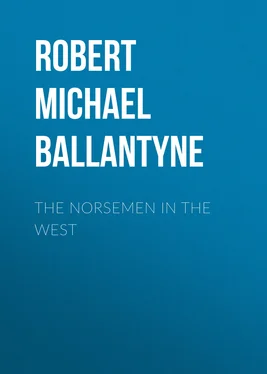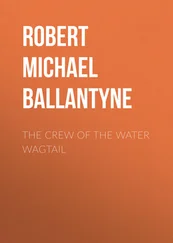Robert Michael Ballantyne - The Norsemen in the West
Здесь есть возможность читать онлайн «Robert Michael Ballantyne - The Norsemen in the West» — ознакомительный отрывок электронной книги совершенно бесплатно, а после прочтения отрывка купить полную версию. В некоторых случаях можно слушать аудио, скачать через торрент в формате fb2 и присутствует краткое содержание. Жанр: Детские приключения, literature_19, foreign_antique, foreign_prose, foreign_children, на английском языке. Описание произведения, (предисловие) а так же отзывы посетителей доступны на портале библиотеки ЛибКат.
- Название:The Norsemen in the West
- Автор:
- Жанр:
- Год:неизвестен
- ISBN:нет данных
- Рейтинг книги:5 / 5. Голосов: 1
-
Избранное:Добавить в избранное
- Отзывы:
-
Ваша оценка:
- 100
- 1
- 2
- 3
- 4
- 5
The Norsemen in the West: краткое содержание, описание и аннотация
Предлагаем к чтению аннотацию, описание, краткое содержание или предисловие (зависит от того, что написал сам автор книги «The Norsemen in the West»). Если вы не нашли необходимую информацию о книге — напишите в комментариях, мы постараемся отыскать её.
The Norsemen in the West — читать онлайн ознакомительный отрывок
Ниже представлен текст книги, разбитый по страницам. Система сохранения места последней прочитанной страницы, позволяет с удобством читать онлайн бесплатно книгу «The Norsemen in the West», без необходимости каждый раз заново искать на чём Вы остановились. Поставьте закладку, и сможете в любой момент перейти на страницу, на которой закончили чтение.
Интервал:
Закладка:
“Not in those places where the snow lies all the summer,” objected Olaf.
“That’s right, Olaf;” said Biarne; “stick up for your sweet aunt. She often takes a stick up for you, lad, and deserves your gratitude.—But come, let’s scatter and survey the land, for, be it good or bad, we must know what it is, and carry with us some report such as Karlsefin may weave into his rhymes.”
“This land would be more suitable for your rhymes, Biarne, than for mine,” said Karlsefin, as they started off together, “because it is most dismal.”
After that the whole party scattered. The three leaders ascended the nearest heights in different directions, and Gudrid with Olaf went searching among the rocks and pools to ascertain what sort of creatures were to be found there, while Freydissa sat down and sulked upon a rock. She soon grew tired of sulking, however, and, looking about her, observed the brothers, who had been left in charge of the boat, standing as if engaged in earnest conversation.
She had not before this paid much attention to these brothers, and was somewhat struck with their appearance, for, as we have said before, they were good specimens of men. Hake, the younger of the two, had close-curling auburn hair, and bright blue eyes. His features were not exactly handsome, but the expression of his countenance was so winning that people were irresistibly attracted by it. The elder brother, Heika, was very like him, but not so attractive in his appearance. Both were fully six feet high, and though thin, as has been said, their limbs were beautifully moulded, and they possessed much greater strength than most people gave them credit for. In aspect, thought, and conversation, they were naturally grave, and very earnest; nevertheless, they could be easily roused to mirth.
Going up to them, Freydissa said— “Ye seem to have earnest talk together.”
“We have,” answered Heika. “Our talk is about home.”
“I am told that your home is in the Scottish land,” said Freydissa.
“It is,” answered Hake, with a kindling eye.
“How come you to be so far from home?” asked Freydissa.
“We were taken prisoners two years ago by vikings from Norway, when visiting our father in a village near the Forth fiord.”
“How did that happen? Come, tell me the story; but, first, who is your father?”
“He is an earl of Scotland,” said Heika.
“Ha! and I suppose ye think a Scottish earl is better than a Norse king?”
Heika smiled as he replied, “I have never thought of making a comparison between them.”
“Well—how were you taken?”
“We were, as I have said, on a visit to our father, who dwelt sometimes in a small village on the shores of the Forth, for the sake of bathing in the sea—for he is sickly. One night, while we slept, a Norse long-ship came to land. Those who should have been watching slumbered. The Norsemen surrounded my father’s house without awaking anyone, and, entering by a window which had not been securely fastened, overpowered Hake and me before we knew where we were. We struggled hard, but what could two unarmed men do among fifty? The noise we made, however, roused the village and prevented the vikings from discovering our father’s room, which was on the upper floor. They had to fight their way back to the ship, and lost many men on the road, but they succeeded in carrying us two on board, bound with cords. They took us over the sea to Norway. There we became slaves to King Olaf Tryggvisson, by whom, as you know, we were sent to Leif Ericsson.”
“No doubt ye think,” said Freydissa, “that if you had not been caught sleeping ye would have given the Norsemen some trouble to secure you.”
They both laughed at this.
“We have had some thoughts of that kind,” said Hake brightly, “but truly we did give them some trouble even as it was.”
“I knew it,” cried the dame rather sharply; “the conceit of you men goes beyond all bounds! Ye always boast of what valiant deeds you would have done if something or other had been in your favour.”
“We made no boast,” replied Heika gravely.
“If you did not speak it, ye thought it, I doubt not.—But, tell me, is your land as good a land as Norway?”
“We love it better,” replied Heika.
“But is it better?” asked Freydissa.
“We would rather dwell in it than in Norway,” said Hake.
“We hope not. But we would prefer to be in our own land,” replied the elder brother, sadly, “for there is no place like home.”
At this point Karlsefin and the rest of the party came back to the shore and put an end to the conversation. Returning on board they drew up the anchor, hoisted sail, and again put out to sea.
Chapter Seven.
Songs and Sagas—Vinland at Last!
In days of old, just as in modern times, tars, when at sea, were wont to assemble on the “fo’c’sle,” or forecastle, and spin yarns—as we have seen—when the weather was fine and their work was done.
One sunny afternoon, on the forecastle of Karlsefin’s ship—which, by the way, was called “ The Snake ,” and had a snake’s head and neck for a figure-head—there was assembled a group of seamen, among whom were Tyrker the Turk, one of Thorward’s men named Swend, who was very stout and heavy, and one of Karlsefin’s men called Krake, who was a wild jocular man with a peculiar twang in his speech, the result of having been long a prisoner in Ireland. We mention these men particularly, because it was they who took the chief part in conversations and in story-telling. The two Scots were also there, but they were very quiet, and talked little; nevertheless, they were interested and attentive listeners. Olaf was there also, all eyes and ears,—for Olaf drank in stories, and songs, and jests, as the sea-sand drinks water—so said Tyrker; but Krake immediately contradicted him, saying that when the sea-sand was full of water it drank no more, as was plain from the fact that it did not drink up the sea, whereas Olaf went on drinking and was never satisfied.
“Come, sing us a song, Krake,” cried Tyrker, giving the former a slap on the shoulder; “let us hear how the Danish kings were served by the Irish boys.”
“Not I,” said Krake, firmly. “I’ve told ye two stories already. It’s Hake’s turn now to give us a song, or what else he pleases.”
“But you’ll sing it after Hake has sung, won’t you, Krake?” pleaded several of the men.
“I’ll not say ‘No’ to that.”
Hake, who possessed a soft and deep bass voice of very fine quality, at once acceded to the request for a song. Crossing his arms on his chest, and looking, as if in meditation, towards the eastern horizon, he sang, to one of his national airs, “The Land across the Sea.”
The deep pathos of Hake’s voice, more than the words, melted these hardy Norsemen almost to tears, and for a few minutes effectually put to flight the spirit of fun that had prevailed.
“That’s your own composin’, I’ll be bound,” said Krake, “an’ sure it’s not bad. It’s Scotland you mean, no doubt, by the land across the sea. Ah! I’ve heard much of that land. The natives are very fond of it, they say. It must be a fine country. I’ve heard Irishmen, who have been there, say that if it wasn’t for Ireland they’d think it the finest country in the world.”
“No doubt,” answered Hake with a laugh, “and I dare say Swend, there, would think it the finest country in the world after Norway.”
“Ha! Gamle Norge,” (Old Norway) said Swend with enthusiasm, “there is no country like that under the sun.”
“Except Greenland,” said Olaf, stoutly.
“Or Iceland,” observed Biarne, who had joined the group. “Where can you show such mountains—spouting fire, and smoke, and melted stones,—or such boiling fountains, ten feet thick and a hundred feet high, as we have in Iceland?”
Читать дальшеИнтервал:
Закладка:
Похожие книги на «The Norsemen in the West»
Представляем Вашему вниманию похожие книги на «The Norsemen in the West» списком для выбора. Мы отобрали схожую по названию и смыслу литературу в надежде предоставить читателям больше вариантов отыскать новые, интересные, ещё непрочитанные произведения.
Обсуждение, отзывы о книге «The Norsemen in the West» и просто собственные мнения читателей. Оставьте ваши комментарии, напишите, что Вы думаете о произведении, его смысле или главных героях. Укажите что конкретно понравилось, а что нет, и почему Вы так считаете.












